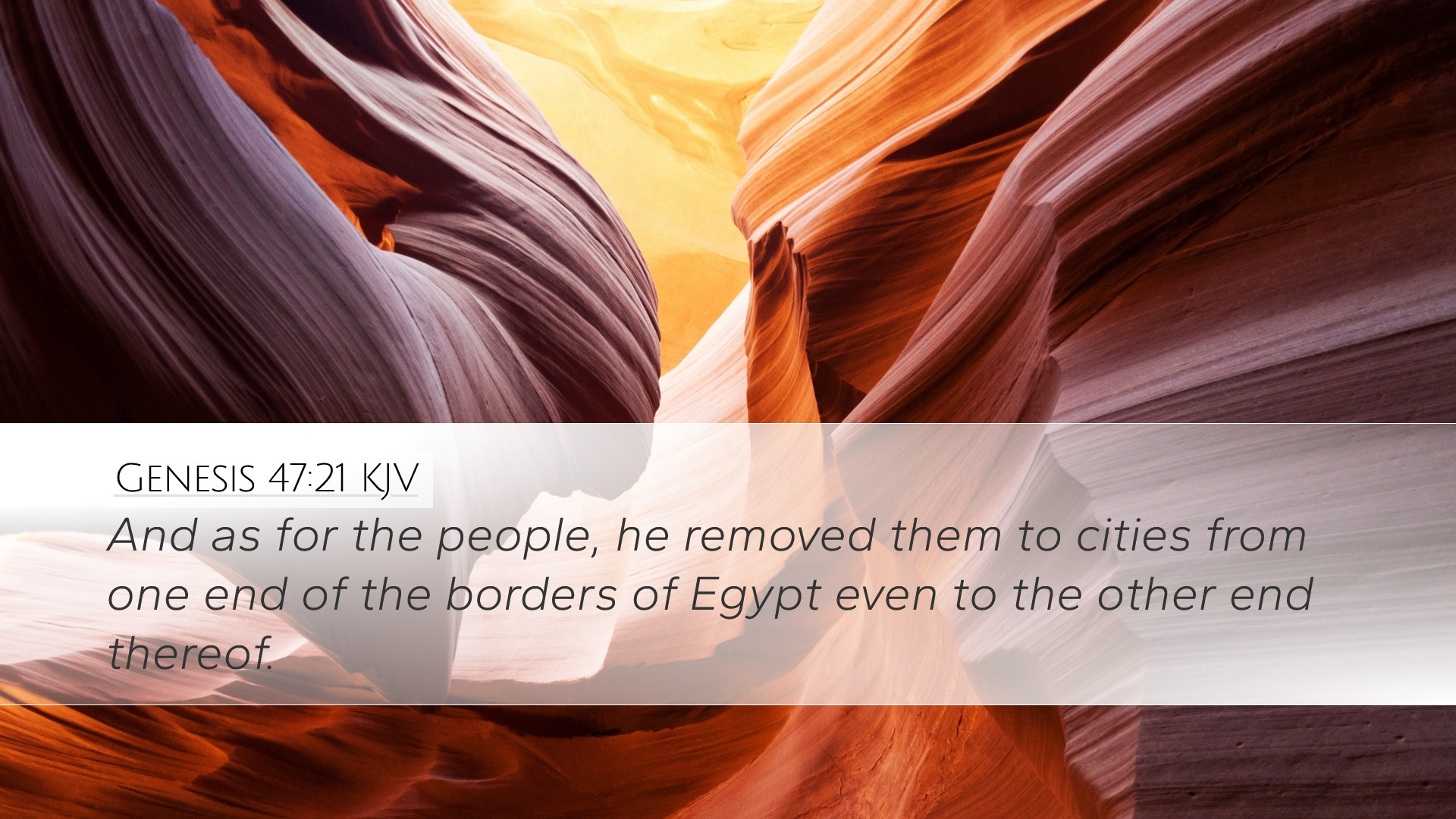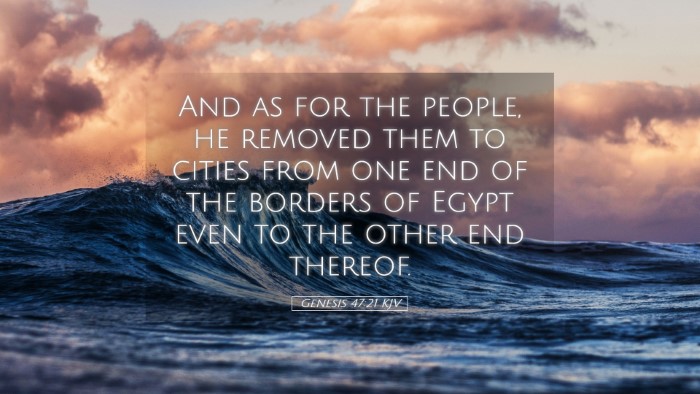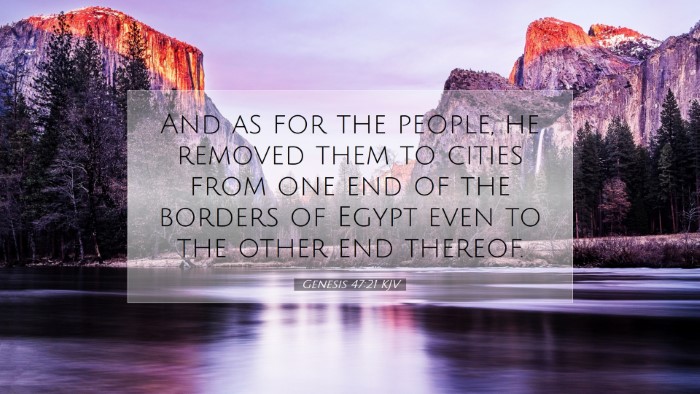Commentary on Genesis 47:21
Genesis 47:21 states, "And as for the people, he removed them to cities from one end of the borders of Egypt even to the other end thereof." This verse is pivotal as it portrays Joseph's administrative decisions during the time of famine in Egypt. It describes the transformation of the Egyptian society under Joseph's leadership and has profound implications for understanding governance, societal change, and divine providence.
Contextual Overview
In the broader narrative of Genesis, chapters 41-47 encapsulate the story of Joseph's rise to power and the ensuing famine which necessitated significant changes in how Egypt operated. Joseph, having interpreted Pharaoh's dreams, prepared Egypt for famine by storing grain. When the famine struck, the people of Egypt came to Joseph, thereby revealing both the socioeconomic structures of ancient Egypt and the divine orchestration guiding historical events.
Analysis of the Text
Joseph's action of removing the people to cities can be viewed through several lenses:
- Administrative Wisdom: Joseph exemplifies prudence in resource allocation. Rather than allowing chaos to ensue due to widespread hunger, he organized the population to manage their needs through localized governance, which reflects a strategic management approach.
- Social Dynamics: By relocating the people, Joseph effectively centralized power and enhanced the Pharaoh's authority. This illustrates the necessity of strong leadership during times of crisis, serving as a reminder to contemporary leaders of the importance of decisive action in turbulent times.
- Provision and Preservation: Joseph's policies ensured not just survival but the preservation of society. The plan to house people in cities helped maintain order and allowed for better distribution of resources.
- Theological Implications: This relocation reflects God's providential care. Joseph's wisdom can be seen as part of the divine plan, fulfilling God's promises to Jacob and his lineage, thus reinforcing the theme of redemption that is woven throughout the Biblical narrative.
Insights from Commentators
Matthew Henry highlights that Joseph’s actions are indicative of a wise ruler who is attentive to the needs of his people. He emphasizes that the purpose of relocating the people was not merely for convenience; it was instrumental in ensuring their survival and welfare during a period of scarcity. Henry notes that the preservation of the Egyptian populace reflects God’s providential governance through Joseph, a foreigner in high office who serves God's purpose by safeguarding and providing for his people.
Albert Barnes provides additional depth by discussing the implications of this population resettlement. He points out that Joseph's redistribution of populace aligns with the practical necessities of famine relief but also sets a historical precedent of governance under pressure. Barnes further elucidates that this action reflects the power dynamics of Joseph's position, where he firmly establishes a system that allows for equitable distribution of grain while reinforcing the authority of Pharaoh. This action also foreshadows the centralization of power in the Egyptian monarchy.
Adam Clarke elaborates on the social and ethical considerations surrounding the relocation of the people. He suggests that although this action was decisive and necessary, it also highlights a potential loss of personal freedom and autonomy for the Egyptian people. Clarke reflects on the balance between public safety and individual rights, raising relevant questions for current societal governance. He emphasizes that Joseph's moves were well-intentioned and aimed at the greater good, but they also showcase the complexities of leadership during crisis and the moral responsibilities it entails.
Thematic Reflections
The verse invites several themes for deeper theological reflection:
- Divine Providence: The sovereignty of God is seen through Joseph's life. His success and strategy during famine reflect a larger narrative of God's involvement in human affairs.
- Leadership and Responsibility: Joseph’s governance presents a model for current leadership that combines faithfulness, wisdom, and practical action. It serves as an exhortation for leaders today to act decisively and compassionately.
- Community and Care: The allocation and organization of resources underline the importance of community care, reminding believers of the church’s role in providing for those in need through organized structures.
- Justice and Equity: The implications inherent in the redistribution of people accentuate the need for fairness in crisis management. Ethical governance should ensure that the vulnerable are not exploited but rather uplifted.
Conclusion
Genesis 47:21 serves not only as a historical account but as a narrative rich with principles applicable throughout generations. Joseph's actions provide a lens through which we can explore themes of justice, leadership, divine providence, and the societal responsibility to care for those in need. Pastors, students, theologians, and Bible scholars can draw from this text and its commentaries insights into how God works through human decisions to fulfill divine purposes. In reflecting on this verse, may we be encouraged to emulate Joseph's wisdom and compassion in our own leadership and communal responsibilities.


